Mental health a key focus for all parties
TORONTO, May 25, 2018 /CNW/ - With the recent passage of Bill 175, the Safer Ontario Act – a transformational piece of legislation that will significantly impact policing in Ontario moving forward – the Police Association of Ontario, Ontario Provincial Police Association and Toronto Police Association recently reached out to each major provincial political party to understand how they plan to effectively support professional policing in this province should they be elected.
Bill 175 is a massive omnibus bill, containing many fundamental updates to how policing is conducted in Ontario, such as the introduction of the Missing Persons Act and whistleblowing protection for members of police services. However, when a Bill this large is so hastily rushed through the process of becoming law without the proper time given to consultations and feedback, it is bound to have serious flaws.
The primary concern with Bill 175 is its potential to allow municipalities to hire security guards in place of trained police to protect and maintain public safety, which will result in fewer front-line police officers in communities across Ontario.
The current Liberal government, responsible for speeding this legislation through to law, maintains that new contracts with "…entities other than a police service must be made in strict compliance with regulations we need to work together to create…", but in the absence of any specifics about which police functions those private entities might apply to, Ontarians are left to wonder whether they will have a police officer respond the next time they call 9-1-1.
Though the NDP voted in favour of Bill 175's passage, the party has come out strongly against the privatization section. "New Democrats believe policing should never be privatized. We will repeal laws passed by Liberals and Conservatives that allow the privatization of policing, including recent changes made to the Police Services Act through the Safer Ontario Act."
Conversely, the Progressive Conservative party was the only party to vote in opposition to Bill 175 when it was passed in March. They have committed to "…fix Bill 175 and treat our police with respect."
Unfortunately, mental health related 9-1-1 calls and police interactions are rising significantly in Ontario and across the country. The proper funding and implementation of accessible resources for those experiencing a mental health crisis is a health care issue, not a policing issue. Yet, some police services in this province are spending more than 15% of their budget trying to make up for the inadequate support available to this vulnerable population.
Police personnel across Ontario appreciate that all three major political parties have acknowledged the need for an increased investment in resources and supports for those struggling with mental illness.
The Liberal party has committed to:
- Spending "…$2.1 billion over four years in mental health and addictions…"
- This includes "…keeping those struggling with mental illness out of the justice system by providing them with the mental health support they require, and at better supporting police forces across Ontario to respond to mental health crisis calls."
The NDP has committed to:
- Expanding "…Mobile Crisis Rapid Response Teams with a new dedicated A Crisis Is Not A Crime fund, which will provide $5 million annually for mobile crisis teams."
- Investing in "…30,000 new supportive housing units over 10 years"
- "Hiring at least 2,600 new mental health workers, and cutting wait times for children's mental health services"
The PC party has committed to:
- "…invest $1.9 billion dollars over 10 years in mental health, addictions and housing supports. These funds will be matched by the federal government, resulting in a $3.8 billion dollar investment in addictions, mental health and other community supports. Some of these funds could be put towards projects such as ride-along mental health workers."
Ontario's professional police strongly believe in initiatives that enhance transparency and build public trust. Safety is an essential component of a fair and just Ontario, and the Police Association of Ontario, Ontario Provincial Police Association and Toronto Police Association call upon the next elected provincial government to provide our police personnel with the essential support required to ensure public safety. We look forward to working together toward the continued growth of our communities across Ontario.
About the Police Association of Ontario
The Police Association of Ontario (PAO) is the official voice and representative body for Ontario's front-line police personnel, and provides representation, resource and support for 50 police associations. PAO's membership is comprised of over 18,000 police and civilian members.
About the Ontario Provincial Police Association
Headquartered in Barrie, the Ontario Provincial Police Association (OPPA) acts as the bargaining agent for its nearly 10,000 uniform and civilian members. Of equal importance, the OPPA serves as the voice of its members in advocating for improved health and safety standards and better supports for members suffering from operational stress injuries.
About the Toronto Police Association
The Toronto Police Association (TPA) is the largest, single association of its kind in Canada and one of the most influential police associations in North America. The TPA represents close to 8,000 uniform and civilian members.
SOURCE Police Association of Ontario

Media inquiries: Police Association of Ontario, For further information: Bruce Chapman, PAO President - [email protected], 905-599-4813; Stephen Reid, PAO Executive Director - [email protected], 416-435-4455; Ontario Provincial Police Association, For further information: Rob Jamieson, President, OPP Association - [email protected], 705-984-6772; Toronto Police Association, For further information: Mike McCormack, President, Toronto Police Association - [email protected], 416-491-4301


Share this article